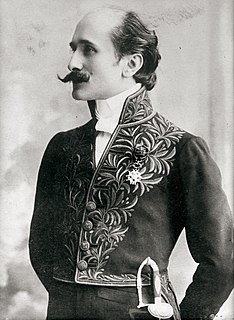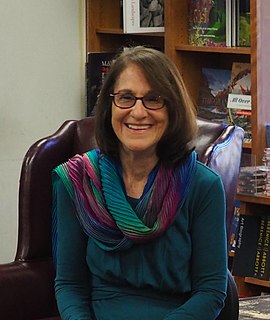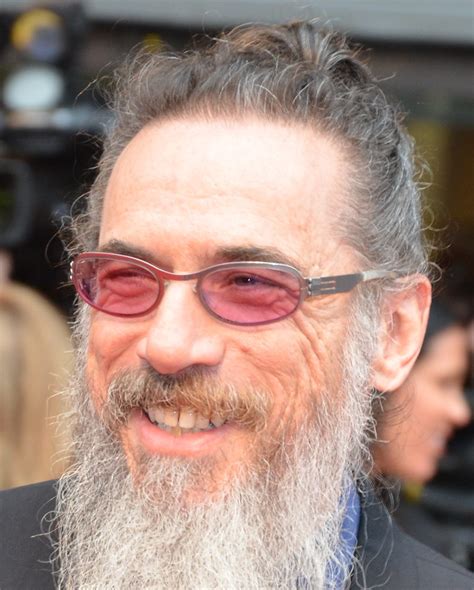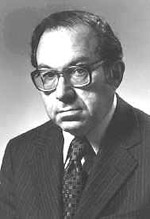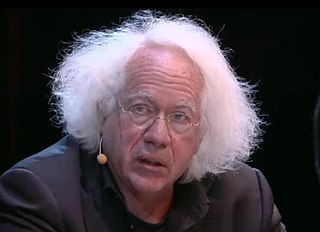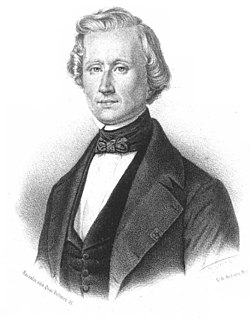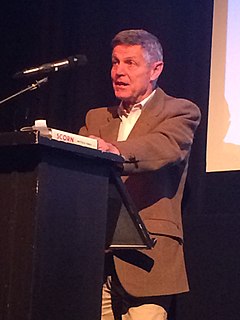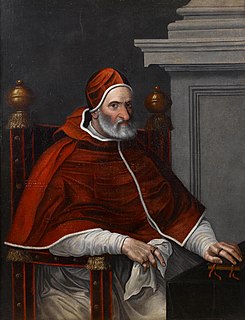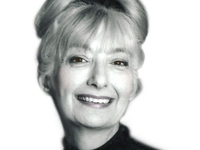Top 902 Secular Humanism Quotes & Sayings - Page 14
Explore popular Secular Humanism quotes.
Last updated on April 21, 2025.
If I were a dictator, religion and state would be separate. I swear by my religion. I will die for it. But it is my personal affair. The state has nothing to do with it. The state would look after your secular welfare, health, communications, foreign relations, currency and so on, but not your or my religion. That is everybody's personal concern!
The gay marriage thing to me, I don't understand why it's so important for the secular progressives in this country, the people who want to change America fundamentally and every way, why this is the lead issue. The L.A. Times, New York Times, San Francisco Chronicle, Boston Globe. These people are going, 'Oh, my God, what are you doing? How can you not see the civil rights aspect of this?'
God, Satan, Paradise, and Hell all vanished one day in my fifteenth year, when I quite abruptly lost my faith. ... and afterwards, to prove my new-found atheism, I bought myself a rather tasteless ham sandwich, and so partook for the first time of the forbidden flesh of the swine. No thunderbolt arrived to strike me down. ... From that day to this I have thought of myself as a wholly secular person.
And what is a kiss, specifically? A pledge properly sealed, a promise seasoned to taste, a vow stamped with the immediacy of a lip, a rosy circle drawn around the verb 'to love.' A kiss is a message too intimate for the ear, infinity captured in the bee's brief visit to a flower, secular communication with an aftertaste of heaven, the pulse rising from the heart to utter its name on a lover's lip: 'Forever.
The clerical system of church management is exceedingly popular, but the whole thought is foreign to Scripture. In a church all the members are active. He [God] appointed some to take oversight of the work so that it might be carried on efficiently. It was never His thought that the majority of the believers should devote themselves exclusively to secular affairs and leave church matters to a group of spiritual specialists.
I love having millions of viewers and I want the show to grow. But more than anything I hope it always impacts people's lives with the honest presence of God and that His authentic power is felt by everyone who watches. I hope it gets so important that it will become the first faith based talk show to find success even on secular TV where people so need the message.
I enter a most earnest plea that in our hurried and rather bustling life of today we do not lose the hold that our forefathers had on the Bible. I wish to see the Bible study as much a matter of course in the secular colleges as in the seminary. No educated man can afford to be ignorant of the Bible, and no uneducated man can afford to be ignorant of the Bible.
The journey homewards. Coming home. That's what it's all about. The journey to the coming of the Kingdom. That's probably the chief difference between the Christian and the secular artist--the purpose of the work, be it story or music or painting, is to further the coming of the kingdom, to make us aware of our status as children of God, and to turn our feet toward home.
Once you get past the grand normative claims made in the West for literature, especially the novel, in the post-Christian era - that it is a secular substitute for religion, hallmark of modern civilization, a priori liberal and cosmopolitan, with authors appearing to implicitly embody such pious ideals - you encounter a less agreeable reality: parochialism, blinkered views, even racial prejudices of the kind the bourgeoisie have held everywhere.
I believe Tunisia and Egypt should look to Turkey and see what not to do. Turkey seems to be a secular and democratic country but it is only a show. We are losing the effectiveness of democratic institutions like parliament and judiciary. They now are turning into tools for the benefit of a president-ordering system. A democratic government is possible only on a comprehensive democratic base surrounded by the participatory action of ordinary people.
I did not worry about what a man or woman personally believed, but the nation's official religion should be outwardly practiced by all its citizens. A religion was a political statement. Being a Calvinist, a papist, a Presbyterian, an Anglican labeled a person's philosophy on education, taxes, poor relief, and other secular things. The nation needed an accepted position on such concerns. Hence the fines for not outwardly conforming to the national church.
It is the most ambitious and driven among us who are the most sorely in need of having our reckless hopes dampened through immersive dousings in the darkness which religions have explored. This is a particular priority for secular Americans, perhaps the most anxious and disappointed people on earth, for their nation infuses them with the most extreme hopes about what they may be able to achieve in their working lives and relationships.
According to one influential wing of modern secular society there are few more disreputable fates than to end up being 'like everyone else' for 'everyone else' is a category that comprises the mediocre and the conformist, the boring and the suburban. The goal of all right-thinking people should be to mark themselves off from the crowd and 'stand out' in whatever way their talents allow.
I'd like everybody to be secular. I suppose I have to say politically I would like religion to become gentler and nicer and to stop interfering with other people's lives, stop repressing women, stop indoctrinating children, all that sort of thing. But I really, really would like to see religion go away altogether.
......the interesting thing was that the Roman Catholic monks and the Buddhist monks had no trouble understanding each other. Each of them was seeking the same experience and knew that the experience was incommunicable. The communication is only an effort to bring the hearer to the edge of the abyss; it is a signpost, not the thing itself. But the secular clergy reads the communication and gets stuck with the letter, and that's where you have the conflict.
For someone whose roots in America were strong but only inches deep, and who had no experience, such as a Catholic child might, of an awesome hierarchy that was real and felt, baseball was a kind of secular church that reached into every class and region of the nation and bound millions upon millions of us together in common concerns, loyalties, rituals, enthusiasms, and antagonisms. Baseball made me understand what patriotism was about, at its best.
I first came up with the idea for the colour-chart pictures back in 1966, and my preoccupation with the topic culminated in 1974 with a painting that consisted of 4,096 colour fields. Initially I was attracted by the typical Pop Art aestheticism of using standard colour-sample cards; I preferred the unartistic, tasteful and secular illustration of the different tones to the paintings of Albers, Bill, Calderara, Lohse, etc.
The Soviet Union began by banishing God. The United States began as a community of people who wanted to worship God as they chose. . . Man does not live by bread alone. Those in the United States whose desire to create a strictly secular society is as strong as Lenin's was should study this Cold War lesson closely. Communism was defeated by an alliance spearheaded by 'one nation under God.'
The evidence for our New Testament writings is ever so much greater than the evidence for many writings of classical authors, the authenticity of which no one dreams of questioning. And if the New Testament were a collection of secular writings, their authenticity would generally be regarded as beyond all doubt.
In many parts of the Islamic world, secular forces, where they exist, tend to be so unsure of themselves, so lacking in self-confidence, that in many cases they line themselves up fairly squarely behind the imperial project and that then creates a big vacuum in which the Islamists become the dominant power because they are the only ones then who are seen as resisting.
I grew up in Brooklyn, New York. I grew up in a very Jewish neighbourhood and thought the whole world was like that. My parents were secular, but I went to a very Orthodox Jewish school, and I really got into it. I found it all fascinating, and I was just kind of really attracted to the metaphysical questions.
I kept saying to myself, this is a calling that God has given me. And so with intention I said, "Okay I'm going to write books not only for the Christian community, but also for the secular community." I found it really rewarding because the last one to use my gifts and advantages to people who look at church as not on their radar screen at all, it gives me favor with - I do a lot with Fortune 500 companies now.
Friedrich Nietzsche predicted that secular people, losing touch with transcendence, would eventually lose a reference point from which to look down and judge themselves. In the end they would lose even the capacity to despise themselves. Thus, because of the 'death of God', they would confuse heaven with happiness, and happiness with health.
First of all, there's no separation of church and state in the Islamic world. They're one and the same. And so when President Bush or Senator Kerry or Prime Minister Blair says, "Look, adopt our secular democracy, look at how good we've done. We have a wonderful level of standard of living for our people," what many Muslims hear is, "Turn your back on God and follow what men say."
Philip Kitcher has composed the most formidable defense of the secular view of life since Dewey. Unlike almost all of contemporary atheism, Life After Faith is utterly devoid of cartoons and caricatures of religion. It is, instead, a sober and soulful book, an exemplary practice of philosophical reflection. Scrupulous in its argument, elegant in its style, humane in its spirit, it is animated by a stirring aspiration to wisdom. Even as I quarrel with it I admire it.
As the dominant social ethic changed from a religious to a secular one, the problem of heresy disappeared, and the problem of madness arose and became of great social significance. In the next chapter I shall examine the creation of social deviants, and shall show that as formerly priests had manufactured heretics, so physicians, as the new guardians of social conduct and morality, began to manufacture madmen.
This success permits us to hope that after thirty or forty years of observation on the new Planet [Neptune], we may employ it, in its turn, for the discovery of the one following it in its order of distances from the Sun. Thus, at least, we should unhappily soon fall among bodies invisible by reason of their immense distance, but whose orbits might yet be traced in a succession of ages, with the greatest exactness, by the theory of Secular Inequalities.
Thanksgiving is a typically American holiday. In spite of its religious form (giving thanks to God for a good harvest), its essential, secular meaning is a celebration of successful production. It is a producers’ holiday. The lavish meal is a symbol of the fact that abundant consumption is the result and reward of production. Abundance is (or was and ought to be) America’s pride-just as it is the pride of American parents that their children need never know starvation.
Institutional Christianity has had clear secular benefits to American life for hundreds of years. It's played both a prophetic role in terms of generating moral critiques of American excesses, and so on, and also a communal role, in terms of building community as the country moved westward to the role my own Catholic Church played in assimilating generations of immigrants.
And on this issue of the Shia in Iraq, I think there's been a certain amount of, frankly, Terry, a kind of pop sociology in America that, you know, somehow the Shia can't get along with the Sunni and the Shia in Iraq just want to establish some kind of Islamic fundamentalist regime. There's almost no evidence of that at all. Iraq's always been very secular.
I dream that one day I can really combine where I came from on network TV, with where I am, and not have to be told by a secular network president again that Jesus won't work on network TV, when I know thats not true. People need the message of love and hope that Jesus represents. He's not divisive. People are. Love is the greatest unifier and Jesus is love.
Now the good of political life is a great political good. It is not a secular good specified by a comprehensive doctrine like those of Kant or Mill. You could characterize this political good as the good of free and equal citizens recognizing the duty of civility to one another: the duty to give citizens public reasons for one's political actions.
I hold conferences, and the result of that was that the secular community also started picking up my stuff, and pretty soon they wanted more. So I realized I could not only minister to the Christian community, but I could also minister to the corporate community. So my books started crossing over, and then I began to intentionally have them cross over.
Secular thinkers have no more been able to work free of the centuries-old Judeo-Christian culture than Christian theologians were able to work free of their inheritance of classical and pagan thought. The process... has not been the deletion and replacement of religious ideas but rather the assimilation and reinterpretation of religious ideas.
If the decline of Christianity created the modern political zealot - and his crimes - so the evaporation of religious faith among the educated left a vacuum in the minds of Western intellectuals easily filled by secular superstition. There is no other explanation for the credulity with which scientists, accustomed to evaluating evidence, and writers, whose whole function was to study and criticize society, accepted the crudest Stalinist propaganda at its face value. They needed to believe; they wanted to be duped.
Today we have a weakness in our education process in failing to understand the natural associations between the disciplines. We tend to study all our disciplines in unrelated parallel lines. This tends to be true in both Christian and secular education. This is one of the reasons why evangelical Christians have been taken by surprise at the tremendous shift that has come in our generation.
The loss of the religious understanding of the human condition—that Man is a fallen creature for whom virtue is necessary but never fully attainable—is a loss, not a gain, in true sophistication. The secular substitute—the belief in the perfection of life on earth by the endless extension of a choice of pleasures—is not merely callow by comparison but much less realistic in its understanding of human nature.
Now a confirmed atheist, I've become convinced of the enormous contribution that Christian evangelism makes in Africa: sharply distinct from the work of secular NGOs, government projects and international aid efforts. These alone will not do. Education and training alone will not do. In Africa Christianity changes people's hearts. It brings a spiritual transformation. The rebirth is real. The change is good.
There is nothing more difficult to outgrow than anxieties that have become useful to us, whether as explanations for a life that never quite finds its true force or direction, or as fuel for ambition, or as a kind of reflexive secular religion that, paradoxically, unites us with others in a shared sense of complete isolation: you feel at home in the world only by never feeling at home in the world.
They [Bishops] shall also banish from churches all those kinds of music, in which, whether by the organ, or in the singing, there is mixed up any thing lascivious or impure; as also all secular actions; vain and therefore profane conversations, all walking about, noise, and clamour, that so the house of God may be seen to be, and may be called, truly a house of prayer.
Growing up we were secular Jews, but what I got out of Judaism at that time in my life was questions. Everything was a question. "Dad, is there a heaven? Is there a hell?" You never could get an answer. That informed a lot of my reasons for getting into Scientology, because they had all the answers. They said I was not my body, not my mind. I don't have a soul; I am an immortal soul. I've lived many lives and I'll live endlessly into the future, and as an immortal soul I have no gender.
Evolution is promoted by its practitioners as more than mere science. Evolution is promulgated as an ideology, a secular religion - a full-fledged alternative to Christianity, with meaning and morality. I am an ardent evolutionist and an ex-Christian, but I must admit that in this one complaint - ...and Mr. Gish is but one of many to make it - the literalists are absolutely right. Evolution is a religion. This was true of evolution in the beginning, and it is true of evolution today.
The barbarians, who possessed no books, no secular knowledge, no education, except in the schools of the clergy, and who had scarcely acquired the rudiments of religious instruction, turned with childlike attachment to men whose minds were stored with the knowledge of Scripture, of Cicero, of St. Augustine; and in the scanty world of their ideas, the Church was felt to be something infinitely vaster, stronger, holier than their newly founded States.
Moral theory develops from the divine command theory of medieval Christian philosophy, mixed up with a bit of ancient pagan virtue theory, to the purely secular moral sentiment and interpersonal reaction theories of Smith and Hume, to Kant's attempt to restore command theory but with something supersensible in the individual rather than God as the source of authority.
For people raised and programmed on the patriarchal religions of today, religions that affect even the most secular aspects of our society, perhaps there remains a lingering, almost innate memory of sacred shrines and temples tended by priestesses who served in the religion of the original supreme deity. In the beginning, people prayed to the Creatress of Life, the Mistress of Heaven. At the very dawn of religion, God was a woman. Do you remember?
I grew up in a secular environment, you know, in the '60s and '70s. My mother's family was Catholic, but you know, just very kind of conventionally Catholic. You know, nothing - there was nothing, you know, extreme about their version of religion. And my father was a free spirit, you know? He had no time for religion at all.
One of the great sadnesses of modern life, because of our disenfranchisement and disillusionment with religion, is that we don't have access to these ideas. Yoga and meditation, for me, is a way of, in this secular world, accessing very very beautiful principles that would perhaps make us happier, at a time when people feel disillusioned with the economy, concerned about the ecology, worried with politicians, and don't trust what they're being told on television.
Zionism is an abominable, racist and colonial movement. Like all colonial and apartheid systems, it's in the interest of all that it be swept away. My hope is to see it replaced, without any bloodshed, with a democratic, secular and lay state – for example on the borders of historic Palestine – and where Palestinians and Israelis could live under equal rights of citizenship without ethnic and religious discrimination. It's a wish that I hope will soon become a reality.
When you truly feel this equal love for all, when your heart has expanded so much that it embraces the whole of creation, you will certainly not feel like giving up this or that. You will simply drop off from secular life as a ripe fruit drops from the branch of a tree. You will feel that the whole world is your home.
I am an atheist. There, I said it. Are you happy, all you atheists out there who have remonstrated with me for adopting the agnostic moniker? If "atheist" means someone who does not believe in God, then an atheist is what I am. But I detest all such labels. Call me what you like - humanist, secular humanist, agnostic, nonbeliever, nontheist, freethinker, heretic, or even bright. I prefer skeptic.






